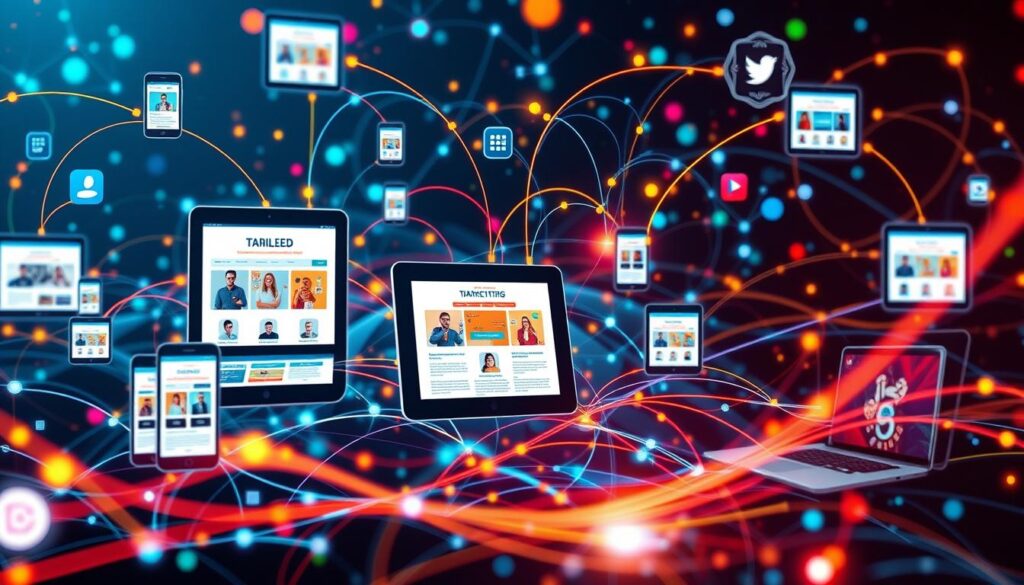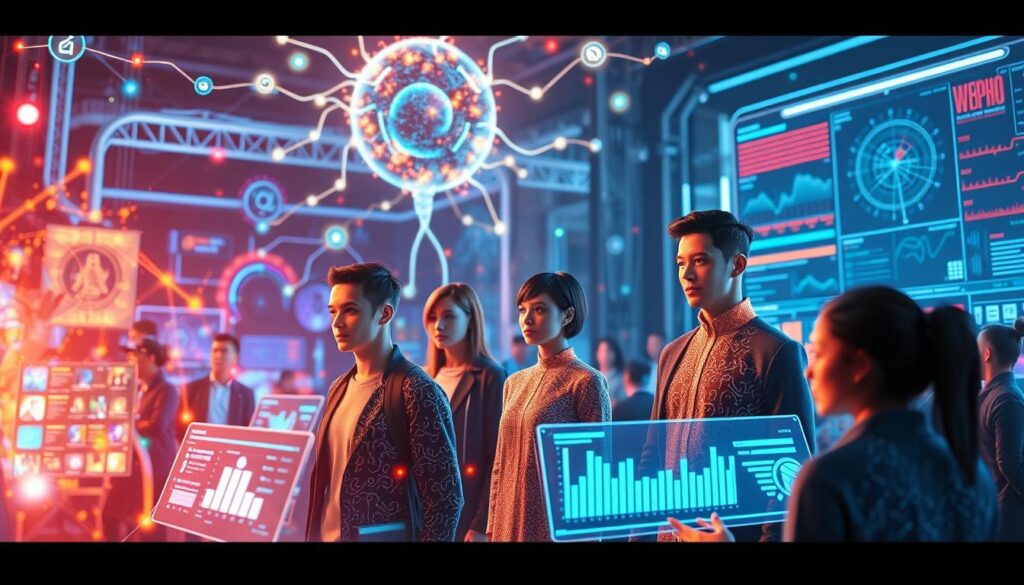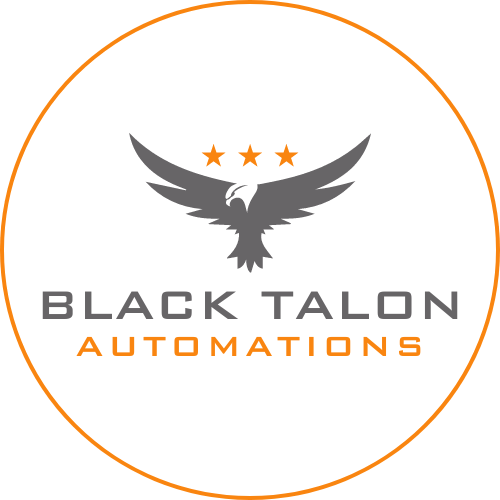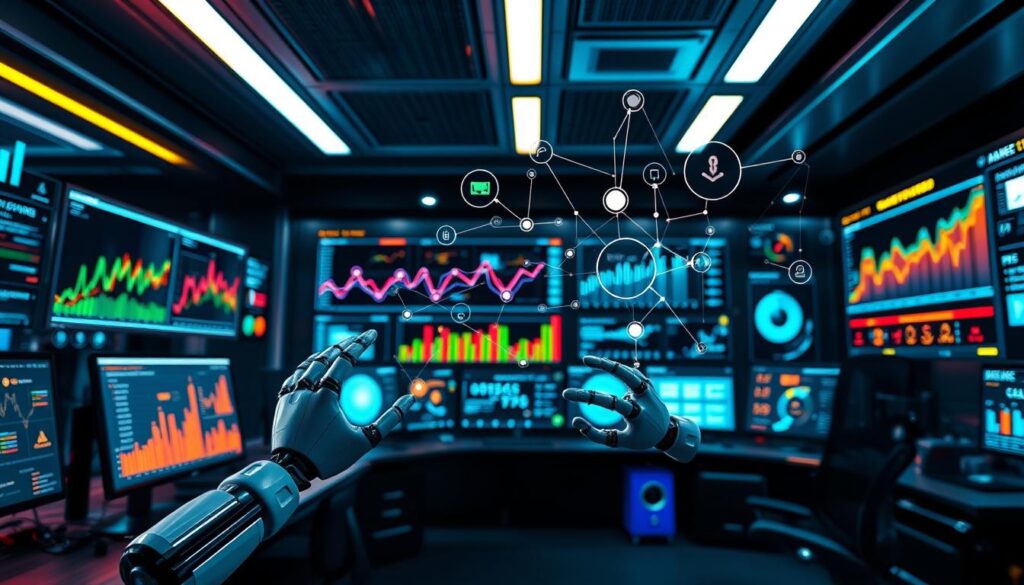In today’s digital marketing world, personalization is key. It helps engage customers better and boosts sales. While simple greetings by name are common, top marketers aim for more. They create experiences that truly connect with their audience.
Personalization in marketing automation is more than just using names. It’s about using detailed data to understand each customer’s unique needs. Strategies like data-driven insights and AI-driven personalization are changing how brands reach out to customers.
By using these advanced tactics, marketers can offer experiences that engage customers deeply. This leads to higher sales and keeps customers coming back. But, personalizing on a large scale comes with its own set of challenges. Marketers must collect and manage data well, all while avoiding making customers feel uncomfortable.
Key Takeaways
- Deep personalization strategies in B2B marketing can increase engagement rates by up to 75% compared to basic personalization techniques.
- Integrating Account-Based Marketing (ABM) into personalization strategies can lead to a 30% increase in Return on Investment (ROI) for high-value accounts.
- Dynamic content and adaptive experiences can enhance conversion rates by 50% when compared to static, non-personalized content.
- Personalized video marketing campaigns have shown an average increase of 80% in engagement metrics such as view-through rates and click-through rates.
- Implementing Artificial Intelligence (AI) tools for personalization can result in a 45% increase in conversion rates through improved targeting and tailored content delivery.
Understanding Data-Driven Personalization Strategies
In today’s digital world, data is key for marketing. Advanced customer data analytics helps businesses understand their audience’s likes, dislikes, and needs. This approach is the heart of personalization strategies that are more than just basic.
Leveraging Customer Data Analytics
Tools like Google Analytics, Sprout Social, and Mutiny help marketers gather and analyze real-time data from different places. They learn about customer journeys, demographics, and what makes them tick. This lets companies build dynamic customer profiles and offer personalized content, deals, and experiences.
Real-Time Behavioral Tracking Implementation
It’s vital to track customer behavior in real-time for personalization that changes as the buyer’s journey does. Tools like Optimizely and IBM Watson Studio use AI to study user data. They then tweak website content, emails, and marketing based on what each person likes and does.
Creating Dynamic Customer Profiles
Personalization engines use insights to keep improving customer profiles. This means content, offers, and calls-to-action are always right for each person. This targeted approach boosts engagement, conversion rates, and revenue.

By using data-driven personalization, businesses can tap into marketing automation’s full potential. They can give customers amazing experiences that lead to real results.
Advanced Marketing Automation Tools and Technologies
Businesses today have access to many powerful tools for marketing automation. These tools help manage customer lifecycles in new ways. They support targeted campaigns, automated marketing, and smooth transitions between stages.
Prisma Campaigns is a platform for credit unions to build strong member relationships. It uses data analytics and real-time tracking to create detailed customer profiles. This allows for personalized and relevant communications.
These tools also support unique uses like member polls, referrals, and scholarships. They combine email, SMS, and online banking for a better customer experience. This approach makes marketing automation more comprehensive.
Pricing for these tools varies based on business size and needs. For example, HubSpot Marketing Hub starts at $800/month. Marketo begins at $895/month, ideal for bigger companies. Salesforce Marketing Cloud offers custom pricing starting around $1,250/month for large enterprises.
Using these advanced tools, businesses can improve customer lifecycle management. They can engage customers more personally and build stronger relationships.

- HubSpot Marketing Hub: $800/month for Professional plan
- Marketo: $895/month starting price
- Salesforce Marketing Cloud: Custom pricing starting around $1,250/month
- Mailchimp: $13/month starting price
- Constant Contact: $12/month starting price
- Brevo: $9/month starting price
- Salesforce Pardot: $1,250/month starting price
- ActiveCampaign: $29/month starting price
- Drip: $39/month starting price
- Hootsuite: $99/month starting price
- Sprout Social: $249/month starting price
- Buffer: $12/month starting price
- Zapier: $29.99/month starting price
- DashThis: Customizable pricing
- Adobe Marketo Engage: $895/month starting price
- Oracle Eloqua: $2000/month starting price
- Customer.io: $100/month starting price with 14-day trial
- Constant Contact: $12/month starting price
- HubSpot: Free option and paid options starting at $0/month
Personalization in Marketing Automation: Going Beyond the Basics
Personalization is key in today’s marketing world. While using a customer’s name in emails is common, advanced strategies are now used. These include dynamic content, behavioral triggered communications, and omnichannel personalization techniques. The goal is to make interactions with customers more personalized and engaging.
Dynamic Content Creation
Dynamic content is a game-changer for personalization. It changes in real-time based on how users interact. This means customers get a tailored experience, like personalized product suggestions or customized web pages.
Behavioral Triggered Communications
Generic emails are a thing of the past. Behavioral triggered communications are now the norm. For example, an email reminding you of items left in your cart or product suggestions based on your browsing history. These are more relevant and boost engagement.
Omnichannel Personalization Techniques
Personalization isn’t just about one channel. Omnichannel personalization techniques ensure a consistent experience across all platforms. This builds trust and loyalty, creating a strong bond between the brand and customer.
As marketing evolves, delivering personalized experiences is crucial for success. By using dynamic content, behavioral triggers, and omnichannel strategies, marketers can focus on the customer. This approach increases engagement, conversions, and loyalty.

AI-Powered Personalization and Predictive Analytics
In the world of marketing, AI and machine learning are changing the game. They help make personalization better than ever. Marketers can now use predictive analytics to understand customer data. This lets them guess what users might want, sort out different groups, and share content that really speaks to them.
AI-driven recommendation engines are changing how businesses talk to customers. These smart systems look at what users have done before. They suggest things that fit what the user likes. This makes customers happier and more likely to come back.
- Using AI and machine learning for predictive analytics helps marketers guess what customers need. This way, they can make campaigns that really hit the mark.
- Tools like AI for making content, sending messages based on what users do, and personalizing across all channels can really boost marketing. It also makes customers more engaged.
- Future trends in AI marketing, like making things super personal, understanding feelings, and smart ads, will change the game.
Marketers who use AI and predictive analytics can create amazing, personalized experiences. These experiences make customers happy and help businesses grow. As marketing tech keeps getting better, keeping up with these changes is key to staying ahead.

Conclusion
Personalization in marketing automation is more than just using names. It’s about using data to create unique experiences. This includes account-based marketing, dynamic content, and personalized videos. It also involves AI and behavioral communications.
These advanced methods make experiences that truly connect with people. They lead to better engagement and results.
Using these strategies, businesses can see big improvements. Personalized campaigns can lead to higher sales and more revenue. For example, they can increase transaction rates by six times and boost revenue by 15% on average.
Segmented emails can even raise revenue by up to 760%. Personalized offers can increase sales by 10-30%. And, 77% of people prefer brands that offer personalized experiences.
To learn more about these strategies, visit crowleymediagroup.com or call (916) 572-9755. Crowley Media Group’s experts can help you achieve great success with personalization.
FAQ
What are the key strategies for data-driven personalization in marketing automation?
How can marketing automation tools enable personalization beyond simple name addressing?
What are the benefits of dynamic content and behavioral triggered communications in marketing automation?
How can omnichannel personalization improve the customer experience?
What are the advantages of AI-powered personalization in marketing automation?
Source Links
- https://medium.com/@aadityasudra/personalization-in-b2b-marketing-beyond-the-basics-6ffc87450a6e
- https://gorevity.com/the-power-of-personalization-in-marketing-automation-funnels/
- https://www.klaviyo.com/blog/marketing-automation-examples
- https://www.banzai.io/blog/data-driven-personalization-elevating-user-experience
- https://www.optimizely.com/insights/blog/how-to-create-a-data-driven-marketing-automation-strategy/
- https://useinsider.com/data-driven-marketing-automation-strategies-and-benefits/
- https://thecmo.com/marketing-automation/marketing-automation-features/
- https://www.woopra.com/blog/the-7-best-marketing-automation-tools
- https://www.salesforce.com/marketing/personalization/guide/
- https://act-on.com/marketing-automation-best-practices-guide/
- https://propellant.media/personalization-effective-email-marketing-strategies/
- https://www.pymnts.com/news/b2b-payments/2024/how-ai-personalization-and-instant-engagement-are-transforming-b2b-marketing/
- https://blogs.infosys.com/digital-experience/emerging-technologies/revolutionizing-marketing-the-power-of-ai-driven-personalization.html
- https://www.linkedin.com/pulse/power-personalization-revolutionizing-marketing-bo-lund-pedersen
- https://nmqdigital.com/blog/the-power-of-data-personalization-for-winning-customer-experiences
- https://spp.co/blog/what-is-marketing-automation/




